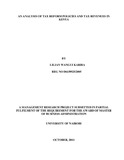| dc.description.abstract | Kenya introduced the Tax Reform Programme in 1986 with the hope that this would, among other things, enhance revenue collection, improve tax administration and reduce compliance and collection costs. Despite the tax modernization, there are concerns that the challenges that confront the Ministry of Finance and Kenya Revenue Authority today are not much different from the challenges that faced these revenue authorities before the reforms.
There are also concerns that tax competitiveness in Kenya is low and the country remains among the most tax unfriendly countries in the world. This study reviewed tax revenue performance during the period 2001 - 2010 in order to identify priorities for further tax reform.
The tax structure is less buoyant and possibly inelastic although indirect taxes, and not direct taxes, hold the capacity to improve the flexibility of the tax system. The challenges that confront tax design include taxation of agriculture and the informal sector, repeal of tax holidays, high effective protection, high dispersion of tariff rates, detailed and rigid custom rules, poor response of V AT to reforms, weak capacity to process large volumes of returns and refunds for zero-rated transactions. In addition, Kenya's tax system is burdensome in terms of time taken to prepare and submit tax returns.
Since the inception of KRA, revenue collection has continued to grow while professionalism in revenue administration has been enhanced. However, challenges remain, inhibiting the achievement of a fully integrated and modem tax administration. The KRA Second Corporate Plan (2003/04 - 2005/06) set the stage for the Revenue Administration Reform and Modernization Programme (RARMP) to ensure that momentum was injected to consolidate the gains that had been made in tax administration.
During the Third Corporate Plan Period (2006/07 - 2008/09), the RARMP made enormous strides in ensuring KRA transformed itself into a modem, fully integrated and client-focused organization. KRA is currently implementing the Fourth Corporate Plan (2009110 - 2011112). This aims to entrench the reforms at the operational levels to achieve operational efficiencies and enhance service delivery. | en_US |

